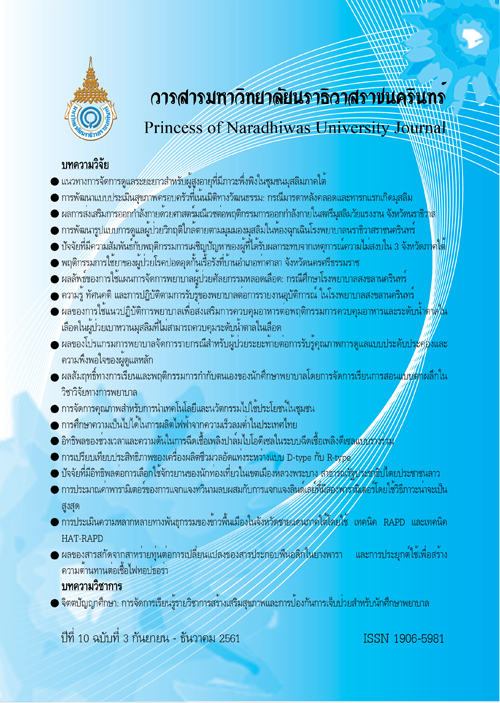Contemplative Education: Learning Management in Health Promotion and Illness Prevention Practicum
Keywords:
Contemplative education, Learning management, Health promotion and illness prevention practicumAbstract
The learning process of contemplative education is a philosophy of higher education that integrates introspection and experiential learning into academic study, in order to support academic and social
engagement, and develop self-understanding as well as analytical and critical capacities, and cultivate skills
for engaging constructively with others. It is based on humanism theory. It helps students to learn “who
they are”. Management of the learning process in contemplative education promotes student self-directed,
and experiential learning. Applied to nursing, a learning model based on contemplative education focuses
on health promotion and illness prevention. It is composed of 6 components, including: 1) concept and
principle of component model, 2) objectives and expected outcomes of model, 3) results of the model, 4) key
concepts of teaching-learning in the model, 5) teaching process of model, and 6) an evaluation or effectiveness of it. The learning dimensions based on the contemplative education is divided into 3 main aspects:
goodness, aesthetic and truth, as well as knowledge. The teaching-learning process in health promotion
and illness prevention subject had 4 steps, including 1) mindfulness for practice (Hand), 2) teaching for
knowledge (Head), 3) experiential learning for creativity and sound mind (Heart), and 4) reflection. These
four steps lead to a planning of contemplative learning, including four steps: 1) practice following the concept of contemplative learning, 2) objectives of activities, 3) set of activities, and 4) expected outcomes.
The plan was implemented. Learning activities used for promoting peace were mindfulness training and
meditation. Mindfulness training with movement, the exchange of learning with the adjustment of the body
and being open minded, thinking development activities, and experiential learning were provided
References
Khemmani, T. (2007). Teaching Science: Knowledge for Effective Learning Process. Bangkok: Publisher of Chulalongkorn University. (in Thai)
Nilchaikovit, T. (2008). A collection of articles on the 2008 Symposium on IntellectualWisdom Education for human development. Bangkok: The Center for Intellectual Education Mahidol University. (in Thai)
Praboromarajchanok Institute for Heath Workforce Development. (2009). Bachelor of Nursing Science Program (revised course 2009). (in Thai)
Thongtavee, C. et al. (2008). Annual Conference on intellectual psychology Education for human development. Bangkok: The Center for Intellectual Education Mahidol University. (in Thai)
Wasi, P. (2008). A collection of articles on the 2008 Symposium on Intellectual Wisdom Education for human development. Bangkok: The Center for Intellectual Education Mahidol University. (in Thai)




